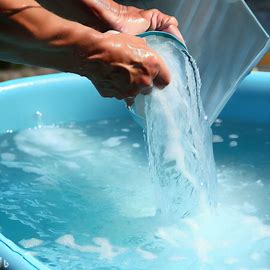Filling an empty pool seems like an easy task – turn on the hose, go to bed, and wake up to a ready-to-use swimming haven. However enticing this may sound for any busy homeowner; there are some crucial considerations before venturing down this path.
Sounds too serious? Don’t get me wrong, folks! Overnight or not, safety should always be at the helm when dealing with pools. And what’s more important than ensuring that our home sweet home remains just as we left it?
Stick around if you’re keen on uncovering if filling your pool overnight is safe or a catastrophe waiting to happen. We’ll splash through the pros and cons so by the end of this blog post, rest assured you’ll have enough ammo to make that decision confidently.
Safety Precautions when Filling a Pool Overnight

Filling your pool overnight can be convenient, but it’s important to take safety precautions to ensure everything goes smoothly.
Before starting the process, make sure you have all the necessary equipment and knowledge to minimize any potential risks.
One essential safety precaution is to closely monitor the filling process.
While it may be tempting to let the water flow unattended overnight, this can be dangerous. Any unforeseen issues or malfunctions could lead to flooding or other problems.
Therefore, it is recommended that someone stays awake while filling the pool and periodically checks on its progress.
Potential Problems with Unmonitored Filling
Leaving your pool unattended during an overnight fill poses several risks. One concern is overfilling, which can cause water overflow and result in damage not only to your property but also to neighboring areas.
Additionally, if there are any leaks or structural weaknesses in your pool, they might go unnoticed if left unchecked overnight.
Another issue with unmonitored filling is related to water quality management. Without proper supervision, you won’t know if contaminants such as dirt or debris enter your pool during the refill process.
This can affect the overall cleanliness of the water and potentially pose health risks for swimmers.
Dealing with Overflow and Flood Risk
To avoid overflow during an overnight fill, carefully consider how much water needs to be added based on your pool size and desired water level.
You should also ensure that all drainage systems around your pool are functioning correctly before starting the fill.
If possible, redirect excess water away from sensitive areas by using pumps or hoses leading away from structures prone to flooding. It’s crucial to regularly check for signs of overflowing throughout the night and react promptly if necessary.
Water Quality and Temperature Considerations

While filling your pool overnight, it’s essential to consider the water quality and temperature.
The longer the water sits stagnant in your pipes during the nighttime hours, the more likely it is that bacteria can multiply.
To combat this, make sure to properly sanitize your pool with chlorine or other suitable chemicals before and after an overnight fill.
Testing the water regularly for pH levels is also advisable.
Additionally, if you live in a region with significant temperature fluctuations between day and night, be aware that cold water can shock swimmers when they enter the pool.
Effects on the Liner or Surface of the Pool

The process of filling a pool overnight may have potential effects on its liner or surface.
Rapid filling can put stress on these components, causing wrinkles or even tears in liners made of vinyl or other flexible materials.
To avoid damage, try to regulate the flow rate while filling your pool slowly overnight.
This will help distribute pressure evenly across all surfaces and minimize any negative consequences.
Impact on Water Bills and Consumption
Filling a swimming pool requires a significant amount of water, which directly affects both your water bill and overall consumption.
If you choose to fill it overnight when rates are typically lower due to off-peak hours, you might save some money compared to daytime rates; however, keep in mind that prices vary depending on location.
It’s worth noting that not all municipalities allow unlimited watering during specific times of the day due to restrictions imposed during drought periods or conservation efforts.
Therefore it’s important always to check local regulations before proceeding with any large-scale refill at any time of day.
The Role of Automated Systems in Safe Overnight Filling
Automated systems play a crucial role in ensuring safe overnight fills for pools by providing continuous monitoring throughout the entire process.
These systems can detect abnormal flow patterns or water level deviations and respond accordingly, such as shutting off the fill if necessary.
Investing in an automated system can provide peace of mind, especially for pool owners who frequently use overnight refilling methods.
However, it’s important to note that these systems should not replace human supervision entirely but rather serve as an additional layer of protection against potential risks.
Tips for Responsible Pool Filling Practices
To ensure responsible pool-filling practices, follow these tips:
1. Regularly inspect your pool for any leaks or structural weaknesses before initiating any refill.
2. Monitor the filling process closely and adjust flow rates as necessary.
3. Prevent overflow by calculating how much water is needed based on your pool size and desired water level.
4. Keep drainage systems around your pool clear to avoid flooding issues.
5. Test and treat the water with appropriate chemicals to maintain proper cleanliness.
6. Consider investing in an automated system for added safety during overnight fills.
By following these guidelines, you can safely fill your swimming pool overnight while minimizing potential risks and ensuring a smooth experience for years to come with safe and refreshing swims.
Conclusion: Making the Decision
Filling your pool overnight can be a convenient way to ensure that your swimming haven is ready for enjoyment during the daytime. However, it’s crucial to approach this task with careful consideration and responsible practices to avoid any potential issues.
Ultimately, the decision to fill your pool overnight or during the day depends on your specific circumstances, comfort level, and commitment to safety.
With the right precautions in place, you can enjoy a beautifully filled pool that provides endless hours of relaxation and recreation for you, your family, and your friends.





